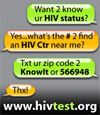New Media Conversations on AIDS.gov - Happy, Healthy eHolidays
Transcript
Season’s greetings from AIDS.gov! As the year comes to a close, we’ve been enjoying the e-cards arriving in our e-mail inboxes. But what are e-cards? And - aside from connecting us with friends and colleagues - how can we use them to respond to HIV?
We looked to Ann Aiken, Health Communications Specialist at the U.S. Centers for Disease Control and Prevention (CDC) and Deb Levine from Internet Sexuality Information Services  (ISIS) to learn more.
(ISIS) to learn more.
What are e-cards?
Wikipedia  describes an e-card
describes an e-card  as “similar to a postcard or greeting card, with the primary difference being that it is created using digital media
as “similar to a postcard or greeting card, with the primary difference being that it is created using digital media  instead of paper or other traditional materials.” E-cards are environmentally friendly (no paper!) and can be cost-effective, too. Ann told us, “The CDC Health-e-Card site provides positive, colorful greetings that encourage healthy living, promote safe activities, or celebrate a health- or safety-related event.”
instead of paper or other traditional materials.” E-cards are environmentally friendly (no paper!) and can be cost-effective, too. Ann told us, “The CDC Health-e-Card site provides positive, colorful greetings that encourage healthy living, promote safe activities, or celebrate a health- or safety-related event.”
A note of caution: Some people use e-cards to spread malicious software, for spam, and for identity-theft - so only click on links in e-mails and e-cards from people you know, and then only those which specify a person’s or organization’s name (not just “from a friend”). And, of course, make sure your antivirus software  is up-to-date!
is up-to-date!
How can the HIV/AIDS community use e-cards?
- To encourage healthy behaviors and to promote HIV/AIDS-related events and resources
The CDC launched their Health-e-Card site on Valentine’s Day 2007. They now provide over 120 e-cards, including three that encourage people to take an HIV test. CDC developed HIV-specific e-cards to support World AIDS Day efforts and to encourage people at risk for HIV to seek HIV testing, learn their HIV status, and take steps to stay healthy and protect their partners.
Ann also told us, “Users are empowered to become advocates for CDC’s health messages. In addition, the viral spread of the medium (those receiving cards also go on to send one themselves) takes advantage of the dynamic nature of today’s online activities.” Approximately 48,000 people have sent CDC’s e-cards and over 90,000 people have viewed the cards.
For other examples of organizations using e-cards to encourage healthy behaviors and promote HIV/AIDS-related resources, check out the World AIDS Day e-cards
 from Care2
from Care2  and the Fight AIDS e-card
and the Fight AIDS e-card  from the Centre for Development and Population Activities
from the Centre for Development and Population Activities  .
. - To provide peer-to-peer partner notification systems for sexually transmitted infections (STIs)
Developed in 2004, ISIS’s inSPOT
 website uses e-cards to assist people in disclosing an STI diagnosis to their sex partner(s). When sending an inSPOT e-card, you are given the option to provide your e-mail or to send the card anonymously. When recipients click on the e-card, they are linked to a page with disease-specific information and local clinic testing services. The inSPOT website has been replicated in several cities across the U.S., as well as in Canada and Romania. It has been translated into Romanian and French, and a Spanish version is in development. To date, more than 30,000 people have sent over 49,500 e-cards.
website uses e-cards to assist people in disclosing an STI diagnosis to their sex partner(s). When sending an inSPOT e-card, you are given the option to provide your e-mail or to send the card anonymously. When recipients click on the e-card, they are linked to a page with disease-specific information and local clinic testing services. The inSPOT website has been replicated in several cities across the U.S., as well as in Canada and Romania. It has been translated into Romanian and French, and a Spanish version is in development. To date, more than 30,000 people have sent over 49,500 e-cards.“E-cards do not replace in-person communication,” said Deb in one interview
 , “but for those people who are diagnosed with an STI, e-cards can enhance sexual communication and help with community responsibility and easing a process of disclosure that can be extremely difficult.”
, “but for those people who are diagnosed with an STI, e-cards can enhance sexual communication and help with community responsibility and easing a process of disclosure that can be extremely difficult.”As one user said, “For some partners, all I had was an e-mail address. After sending inSPOT cards, I got some backlash, but the ending was always, ‘I’m glad you told me.’”
E-cards can be a useful tool to help you communicate - whether for partner notification, inviting people to an event, encouraging safe behaviors, or simply sending season’s greetings to your friends, colleagues and constituents. Happy Holidays - and it’s not too late to send an e-card to that special someone!



